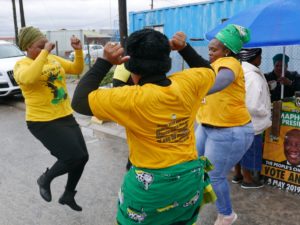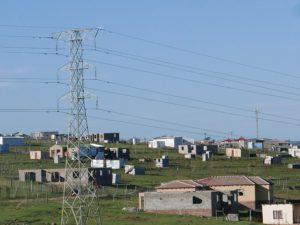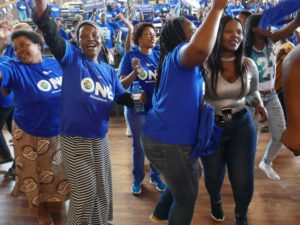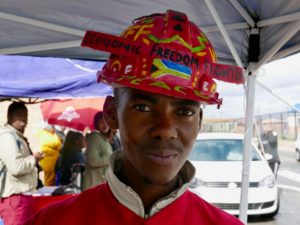Martin Plaut
Senior Research Fellow – ICWS
It was a remarkable achievement. South Africa’s sixth election since the end of apartheid saw nearly 17.7 million people vote at 22,924 voting stations.They had a choice of 48 parties who were attempting to get into the National Assembly, or parliament. In the end just 14 parties succeeded.
The election was not without its flaws. It turned out that, with the right chemicals and a little effort, the supposedly indelible mark made on all voter’s thumbs when they cast their votes could be removed. A handful of people have been prosecuted for voting more than once. Voting stations ran out of ballots and the opposition Democratic Alliance (DA) rightly complained that many of these seemed to be in areas in which the party has high support. But a friend of mine explained how the election officials went out of their way to take mobile phone numbers and call people back when fresh ballot papers arrived, rather than expecting citizens to wait around in the intervening two or three hours.
A bigger issue is the question of voters abroad. Citizens have the right to vote, but it is made as difficult as possible. There are forms to fill in, and others to present at South African embassies and High Commissions. A total of 29 334 were approved, but this is a tiny fraction of the population overseas. Voters in Britain must vote in London in person. They cannot do so at the consulate in Glasgow. This is perhaps not surprising: most of those abroad support the opposition. If one contrasts this with the care that is taken to allow the frail and infirm to vote in South Africa itself (with voting ahead of election day or home visits) it is difficult not to conclude that this is a form of not very subtle jerrymandering.
I spent the best part of two weeks in South Africa touring the rural areas of the Eastern Cape, Port Elizabeth and the Cape Town area. I made a point of going to areas off the beaten track and to visit African people in their homes (they make up over 80% of the population.) My conclusion is that despite the problems outlined above, the 2019 election was a credit to the country and to the Independent Electoral Commission. It was – to use the phrase that is always trotted out at these moments – a ‘free and fair’ representation of the views of the people.
The results
The overall poll was 65.1% of the potential electorate, which has led some commentators’ to regard the election in a firmly negative light, with disturbing levels of voters’ failure to register (despite a determined campaign targeting first-time potential voters) and varying degrees of non-engagement.
“This was an exceptionally low-turnout election; an almost shockingly low-turnout election compared to previous national elections. South Africa has never had a national election with less than 70% overall turnout. In 2014, turnout was 72.5%. The overall turnout for the 2019 national election (including all overseas voters who filled in VEC10 forms), is 65.1%. This is much lower than anticipated and influenced the election outcome significantly.”
African National Congress
As many will know by now, the African National Congress was victorious and will govern South Africa as it has for the past quarter of a century. But its share of the vote fell and it will have 19 fewer seats in parliament than it did in 2014. Under Nelson Mandela the ANC took 62.7% of the vote. This year it won 57.5%. This was hardly a poor showing, given the mire of corruption associated with the ANC under President Jacob Zuma. But the recriminations have already begun.
In 2016 the party won 55% in municipal elections. Some inside the party speculated that if Zuma had remained in charge (via his former wife, Dr Dlamini-Zuma – widely regarded as his proxy) support for the ANC might have fallen as low as 40%. This assessment was made by none other than Fikile Mbalula, head of the ANC’s election operation. But the party remains badly divided between supporters of President Ramaphosa and those who continue to be associated with former President Zuma. The ANC secretary general, Ace Magashule, a fierce opponent of Ramaphosa, declared that the president cannot take credit for the party’s majority win in this year’s elections. Magashule said the ANC was not about individuals. “The people who made us win the elections are volunteers, communities and people who love the ANC. The ANC has never been about an individual.”
Whichever side wins this battle, one fact remains: despite a blizzard of bad news about corruption and abuse, just over a half of all South Africans still vote for the ANC. Travelling round the rural areas it is not hard to see why. While many areas have been neglected, most have water, electricity and sanitation – something they seldom had under apartheid. People living in descent homes, even if the electricity sometimes fails, don’t forget that in a hurry. The power cables strung out across the country speak volumes to the voters.
Democratic Alliance
The official opposition – the DA – also received a blow. It won 20.8% of the vote, a fall of 1.5%. Its leader, Mmusi Maimane is a wonderful orator, but has been accused of moving the party towards the ANC, making black empowerment a cornerstone of party policy. Maimane has said he accepts responsibility for the DA’s failure to make progress. This has not stopped his critics. Helen Zille, who was his predecessor as party leader, has argued that it is what she terms ‘identity politics’ that is eating into DA support. “Our job is to build a new majority on the basis of a common set of values, among people who genuinely want one South Africa for all (unlike — for example — the EFF that wants South Africa for one race only), Zille argues. “We are a party for people who are committed to addressing the real problems preventing economic growth, improved education, and social progress, without seeking to scapegoat minorities. It is fallacious to present the key issue in SA as a dichotomy between ‘black poverty’ and ‘white privilege’. The face of privilege has been transformed by a predatory ANC/EFF elite that has looted the country and set us on the road to ruin. The DA should not pander to this analysis.”
It is a powerful argument, but it remains to be seen whether it is one the DA as a whole will accept. It was not the only issue the DA faced. It had made a mess of an attempt to expel Patricia de Lille from the party. She went on to launch a party of her own (GOOD) and took two seats.
The other parties
The backing for the Economic Freedom Fighters (who are young, brash and vocal) and their militant leader, Julius Malema, was widely over-estimated. Nonetheless, they were the largest winners, taking an additional 19 seats and their percentage of the vote to 10.8%. The difficulty for the EFF is that they have to show that they are more than just an oppositional force and can actually contribute to the political process. In three provinces (Limpopo, Mpumalanga and North-West) they are the official opposition. This will give Malema’s party the chance to show what they are really made of. In Gauteng (the province that includes Johannesburg) the ANC only has the slimmest of majorities (50.2% of the vote). Will the EFF work with the rest of the opposition to hold the ANC to account, or go into office, swayed by offers of positions in the administration?
The mainly Afrikaner, Freedom Front Plus were the second major gainers. They took 10 seats and increased their share of the vote by more than 2% to 2.4%. Adopting the slogan “Fight back” they played on white fears that their positions in the country were being eroded. Afrikaans has been abolished as the official language in several universities (including Stellenbosch – the alma mater of most Afrikaner Prime Ministers and Presidents). There was also an incident in a small rural town (Schweizer-Reneke) in which a school teacher was – incorrectly – accused of racism. The DA jumped on the bandwagon and as a result lost every single voting district in the district, as well as damaging their support base nationally.
Conclusion
With the election over, political life has resumed as normal. Both the ANC and DA are holding internal party discussions, to try to remedy what went wrong and apportion blame.
President Ramaphosa has declared that he will not appoint anyone to government who had been accused of corruption. In his first speech to supporters following the election, Ramaphosa said he would not appoint leaders who worked “to fill their own pockets”. He told thousands of supporters in downtown Johannesburg: “We are going to end corruption whether they like it or not.” The revelations by a government commission investigating graft, often aired live on television to fascinated South Africans, “must be things of the past”, the president said. Living up to this commitment will mean taking on Zuma and his allies – something Ramaphosa has skated around since being elected party leader and president of the country. Zuma is not without supporters and continues to sit on the ANC National Executive. As the journalist, Carien du Plessis, pointed out: “Zuma has become the only ex-ANC president who still faithfully attends party events, and although some say he comes there to sleep, his presence quite correctly signifies the fact that he is still very much present in the day-to-day workings of a very divided ANC.”
For ordinary South Africans life continues much as before. The political assassinations inside the ANC, which have so disfigured the politics of KwaZulu-Natal, continue as factions vie to keep control, and the backhanders that office brings with it. So too does unemployment, which has driven so many into poverty. In the first quarter of 2019 237,000 jobs were lost. The official unemployment rate stands at 26.6% – among the highest in the world. More than 55% of those between 15 and 24 years old are unemployed. This is a personal tragedy for those who linger without a job; it’s a tragedy for the country, which has failed them so badly. Cyril Ramaphosa has a great deal on his plate.





Recent Comments